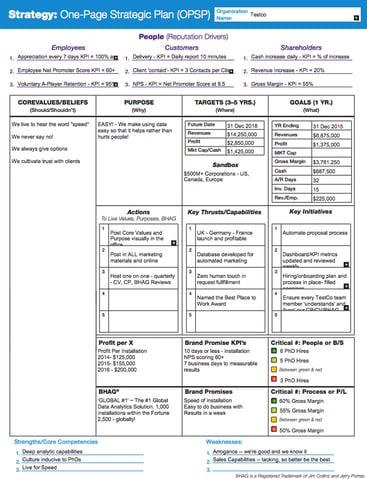10 Tips For Scaling Up Your Business For When You Start Implementing

When the pandemic hit the world in early 2020, I reached out to check on a former student of scaling up, J.D. Ewing. Ewing is the CEO of COE Distributing, an award-winning industry leader in the office furniture niche.
Ewing told me that two and half weeks of their operations had hit a rough patch. But despite that, they still closed the first quarter of 2020 with record numbers - their most profitable quarter ever an a great achievement given the global situation. He was also happy to report that they didn't even have to let go of anyone.
COE Distributing is what I refer to as a Gazelle.
“The OPSP guides us quarterly,” says Ewing. “We used other Scaling Up tools to put our first 36-month cashflow together [in 2019], and when we combined it with the OPSP, it’s been very powerful.
We know exactly what the numbers are and where we want to go. We know whether we’ve hit the mark or not. We can measure and keep everyone accountable.”
I’ve spent over 30 years helping thousands of business leaders like Ewing scale up their ventures and their business. My team and I focus on helping cities and countries create scaleup eco-systems to support the already robust startup eco-systems that exist.
Here’s what I know:
- CEOs and executives of growth firms want ideas and tools they can implement immediately to improve some aspect of their business.
- Ideally they’d like to enjoy the ride along the way!
The Gazelle In A Startup World
We tend to see more attention and support available for those who wish to open their own business. And this is understandable since there are so many startups and small businesses.
However, the companies that generate the most growth for the country, and provide a good number of jobs and development, are the high impact firms. The Gazelles.
“High-impact firms are relatively old, rare and contribute to the majority of overall economic growth. On average, they are 25 years old, they represent between 2 and 3 percent of all firms, and they account for almost all of the private sector employment and revenue growth in the economy.”
— High-Impact Firms: Gazelles Revisited
If you’ve been in business for less than 25 years, you still have time to make it big. If it has been more than 25 years, and you’ve not yet scaled up, it’s never too late!
Here are 10 tips for getting started in scaling up your business:
1. Get Educated
Leaders are readers. Great leaders know one thing — having a natural curiosity and thirst for learning separates the good from the great.
I’m not going to lie, scaling up will shake things up at your company. You must be able to handle whatever is thrown at you. And for that to happen, you must have the expertise that comes with knowledge and experience to handle it.
Follow the example of successful leaders:
- Larry Page, Former CEO of Google:
When asked how he learned to run a company, he responded “I read a lot.” For instance, he read three books on how to name things. - Mark Cuban, Owner of Dallas Mavericks:
Reads 3 hours per day. His goal is to find just one idea he can use to give him and the over 150 companies in which he’s invested an edge in the marketplace. - Warren Buffett:
His first priority has always been to reserve quiet time for reading and thinking, particularly that which might advance his learning, no matter how old he got. - Mark Zuckerberg:
His personal development priority in 2015 was reading a book every two weeks. - Bill Gates:
For decades, he maintained his famous “Think Week”, devouring a record 112 books/articles/whitepapers during one session.
2. Understand Your Niche And Its Competitive Advantage
Understanding the niche in which you belong is key to growth. Your business needs to have a deep understanding of what your competitive advantage is over your competitors (and vice versa).
You want to dominate your niche! Do this by creating a differentiated strategy and setting your #1 Priority. Think Facebook, and Mark Zuckerberg’s almost maniacal priority to figure out a wireless strategy. Think Steve Jobs' decision at Apple to focus on just producing two desktops and two laptops.
So what is your niche that you’d like to dominate?
One of the tools I recommend for nailing down your niche and competitive advantage - if you haven't already - is the 7 Strata of Strategy. A winning strategy is often differentiated from your competition and also easy to remember. Use the tool to outline the words you want to own, your differentiating activities, and you "X Factor".
3. Know When To Say No
In the early stages of growth, it's common for companies to say “yes” to everything — even things they aren’t sure they will be able to deliver on.
But here’s the thing. In order to scale up, you need to concentrate on winning in your niche. Which means that at some point you'll need to reject everything that isn’t moving you towards your goal.
So yes, while in the beginning you might need to say “yes” to everything, feel free to do so. But say “yes” only until you have the luxury to say “no”. You know you’re there when you start saying “no” to customers that don't fit with your business model or to 19 of the 20 people wanting to work with you.
4. Get Your Strategy Right
Good strategy is crucial for growth. It generates sustainable top-line revenue growth, creates raving fans of your product/service, gets your whole team on the same page, grows as you grow, and yes, takes a whole lot of constant work.
This step isn’t easy, but it is worth it.
In fact, a good indicator that your scaling up strategy is on point is when you start saying “No” more than you are saying “Yes”.
I've already mentioned how you can create a winning a strategy with the 7 Strata of Strategy tool. (One important component of the 7 Strata is your BHAG, which I talk about here.)
Next, you'll want to lay out milestones and an execution plan based on that strategy. With the help of your leadership team, fill out your short, medium and long-term goals with the One Page Strategic Plan. This one page framework will make it much easier to detail your company vision for everyone involved.
5. Attract And Keep The Right Talent
Senior leaders know they have built an organization that can scale — and is fun to run — when they aren’t necessarily the smartest people in the room.
That's why attracting and hiring the right people is as critical as landing the right customer. Scaling up people is where it counts, because they'll make or break your organization.
And I don’t mean just the senior team — every person in your company should be hired so they fit in with your strategy and culture. Every single person is valuable. So spend some time developing a strategy to attract and keep the right people.
City Bin Co. And Attracting The Right People
Gene Browne's City Bin Co. was recognized as one of the Best Managed Companies in Ireland.
Yet he still couldn’t easily attract and hold on to employees to sling garbage cans. It’s a dirty and physically demanding job requiring an early start in the morning.
Browne knew he needed to get creative in attracting the right people to work on the back of his garbage trucks. They were the people that can make or break a service experience.
Then a young man named Gary Manogue applied for a back-of-the-truck job. His reasoning was that (a) he saw it as a chance to do part of his daily workout while also being paid and (b) the early start and finish times suited his lifestyle. Browne saw this as his opportunity.
Gary was a competitive kickboxer and had ambitions to win a world title fight. He needed to train as many hours a day as possible. In December 2013, Gary became the world super welterweight kickboxing champion. In a pre-fight interview, the Galway Advertiser noted:
“This is Manogue’s first seven-round fight and he has prepared with a fitness regime that involves an eight-kilometre run every morning, workout in the gym in the evening, and in between working for The City Bin Co. ‘Running after bins keeps me pretty fit too,’ he says.”
The City Bin Co. has since developed a hiring campaign aimed at unemployed young men who are big into fitness. The campaign asks, “Would you like to be paid for your daily workout?”
These young men do not perceive the job in the same way as the typical young person who is handing out CVs looking for a job.
6. Learn How To Manage Your Team
“The bottleneck is always at the top of the bottle,” — Peter Drucker
Great leaders are excellent delegators. You can’t (and won’t be able to) do everything by yourself. As your company scales up, the toughest decisions involve people and their changing roles in the organization, especially within the leadership team.
Invest time and effort learning to manage your team effectively, so you’re not getting involved in tasks that should be taken care of by others.
Here are five activities of successful managers:
- Help people play to their strengths.
- Don’t demotivate; start “dehassling.”
- Set clear expectations, and give employees a clear line of sight.
- Give recognition, and show appreciation.
- Hire fewer people, but pay them more.
7. Think Outside Investor Money
While investor money sounds great, you should also look at ways to obtain funds outside of the investor circles. With platforms such as Kickstarter and Indiegogo, there are now other ways to test your concept to see if it is viable as well as to raise money that don’t involve investors.
I recommend reading The Customer-Funded Business: Start, Finance, or Grow Your Company with Your Customers' Cash by John Mullins, Associate Professor at the London Business School and also a good friend of mine.
John's work details the ideas and strategies you can use to obtain more funds outside investor money. When it comes to having customers pay you in advance, you have a lot more options than you might imagine.
8. Be Wary Of The Word “Innovation”
Innovation has become a keyword in most companies. But I’d ask you to take a step back and instead, focus on refining the product you already have.
This isn’t to say, never launch anything new, but in our rush to innovate, we might leave a half baked product on the line.
9. Business Opportunities Are Everywhere
Don’t let trends give you tunnel vision because business opportunities are everywhere. It might seem that in recent years, with the birth of countless technology companies, that this sector is the only way to success. But this is just not true.
Kimbal Musk, younger brother of Elon Musk decided to enter the food business and is currently making huge waves in changing the way we see, produce, and eat food in the United States and around the world.
It’s best to keep your eye open for opportunity than to just follow what is currently trendy.
10. Gain Experience Before You Begin
Finally, we come to my last point, which coincides with my first point — and that is, do the work.
Let me explain. In point #1, I assert that education should always be the top most priority for any leader. In my final point, I’d like to add, “gain experience” to that list. So in essence, education plus experience will make one fine leader.
There is no other way to gain experience than to do the work. This will help you understand how things work, see what others are experiencing, and how to manage the progress in your company.
Conclusion
With these tips and tools in place, you’ll soon be well on your way to scaling up your business!
Don’t forget to check out my 10 Rockefeller Habits Checklist that goes into more detail in how to scale up your company. When you’re done with that, you can further align your team and your company with the One Page Vision Summary.
Are you already practicing any of the tips I mentioned above? Leave a comment below and let me know!



%2016.55.51.png)
